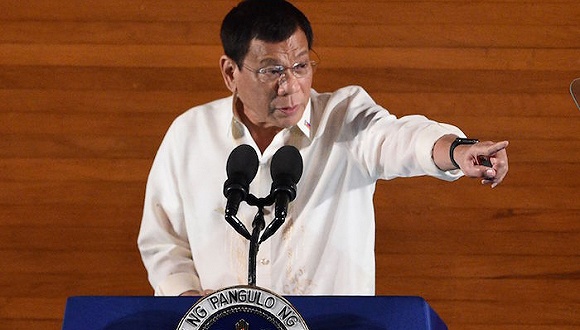


[File photo]
Philippines President Rodrigo Duterte, who arrives in Beijing on Oct. 18 for his first state visit to China, will hold talks with Chinese officials on multiple issues including weaponry purchases and economic cooperation, according to reports by Chinese media.
The president said in an interview with Phoenix TV that the recent joint military exercises between the Philippines and the U.S., which ended last week, will be the last set between the two countries while he is in office. Duterte also stated that the possibility remains for Philippines-China or Philippines-Russia military exercises.
Duterte refuted the claim that U.S.-Philippines military exercises could deepen military cooperation, instead calling them "a perfect opportunity to court death."
"The U.S. gave us two aircraft without weapons," said Duterte in an interview. "What we face in war are 3,000 aircraft from China's People's Liberation Army." Duterte expressed his hope that China could offer weapons to the Philippines via loans and assistance. He also expects that China will support his country in combating terrorism.
Oh Ei Sun, a senior fellow with the Malaysia Program at the S. Rajaratnam School of International Studies at Nanyang Technological University, told People's Daily Online that if China offers the right price, Duterte might even buy weapons from China, following the lead of many other Southeast Asian countries, which have diversified their weapons arsenals by purchasing weapons from Russia, China, France and other nations.
Duterte’s state visit, which will run from Oct. 18 to 21, comes at the invitation of his Chinese counterpart, Xi Jinping. China is the first non-ASEAN country that Duterte has visited since he became president in July.
According to Oh, Duterte is not happy about the U.S. criticizing his anti-drug campaign, yet failing to provide substantial economic assistance.
"He has to look for alternatives, and China, with its humongous foreign investment capability, comes instantly to mind," Oh added.
Before leaving Manila, Duterte highlighted economic and trade cooperation. In an interview with China News Service, Duterte said he hoped to consolidate business relations with China. He also stated that the Philippines needs capital and technology support from China to develop its industry. During his visit, a delegation of entrepreneurs from the Philippines will sign agreements with China, according to Duterte.
This choice of China instead of the U.S. as Duterte’s first non-ASEAN state visit is a demonstration to the U.S. of his independent mind. Nevertheless, the South China Sea issue still challenges Sino-Philippines relations.
In an interview with China Daily, Xu Liping, an expert on Southeast Asian affairs from the Chinese Academy of Social Sciences, noted that Duterte has repeatedly demonstrated his goodwill toward China by avoiding inflammatory remarks on the South China Sea arbitration.
Oh echoed Xu's opinion, saying that Duterte would put the South China Sea issue on the back burner and focus on economic cooperation, though he also has to deal with Manila’s political elite, who keep harping on the issue.
"I'll be there to talk about it softly," Duterte told China News Service. "We take away [the possibility of] war or violence, because that is not a good option."
Oh told People's Daily Online that the goal is not so much to improve but to restore the previously warm relations between China and the Philippines. He said Duterte is looking forward to resuming various cooperative economic programs that were put on hold for the last few years.
However, Oh said he has yet to see Duterte act on his stated intentions to ramp up ties with China – at least not beyond his anti-American and seemingly pro-China rhetoric.
"I think at the end of the day, just like many other Southeast Asian nations, Duterte has to balance his national interests between two superpowers," Oh said.
Given the long history between the Philippines and the U.S., it is difficult to see U.S.-Philippines relations rupturing significantly beyond Duterte's term, Oh added.
 Fire brigade in Shanghai holds group wedding
Fire brigade in Shanghai holds group wedding Tourists enjoy ice sculptures in Datan Town, north China
Tourists enjoy ice sculptures in Datan Town, north China Sunset scenery of Dayan Pagoda in Xi'an
Sunset scenery of Dayan Pagoda in Xi'an Tourists have fun at scenic spot in Nanlong Town, NW China
Tourists have fun at scenic spot in Nanlong Town, NW China Harbin attracts tourists by making best use of ice in winter
Harbin attracts tourists by making best use of ice in winter In pics: FIS Alpine Ski Women's World Cup Slalom
In pics: FIS Alpine Ski Women's World Cup Slalom Black-necked cranes rest at reservoir in Lhunzhub County, Lhasa
Black-necked cranes rest at reservoir in Lhunzhub County, Lhasa China's FAST telescope will be available to foreign scientists in April
China's FAST telescope will be available to foreign scientists in April "She power" plays indispensable role in poverty alleviation
"She power" plays indispensable role in poverty alleviation Top 10 world news events of People's Daily in 2020
Top 10 world news events of People's Daily in 2020 Top 10 China news events of People's Daily in 2020
Top 10 China news events of People's Daily in 2020 Top 10 media buzzwords of 2020
Top 10 media buzzwords of 2020 Year-ender:10 major tourism stories of 2020
Year-ender:10 major tourism stories of 2020 No interference in Venezuelan issues
No interference in Venezuelan issues
 Biz prepares for trade spat
Biz prepares for trade spat
 Broadcasting Continent
Broadcasting Continent Australia wins Chinese CEOs as US loses
Australia wins Chinese CEOs as US loses